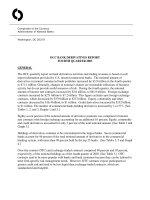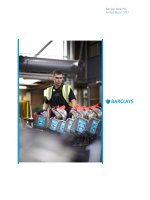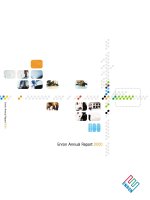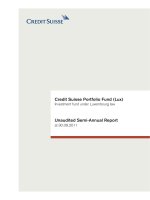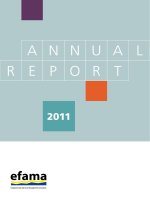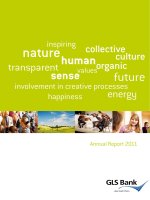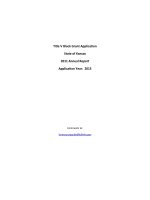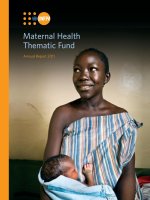Annual Report 2011: GLS BANK doc
Bạn đang xem bản rút gọn của tài liệu. Xem và tải ngay bản đầy đủ của tài liệu tại đây (2.23 MB, 56 trang )
1
inspiring
collective
human
nature
culture
transparent
values
organic
sense
future
involvement in creative processes
energy
happiness
Annual Report 2011
2
3
Dear Readers,
GLS Bank’s way of working is humane, forward-looking and economically oriented. The
2011 Annual Report summarises the results of these three aspects of our work and comple-
ments our continuous reporting in our customer magazine “Bankspiegel”.
The 2011 business year was characterised by a great demand for our banking offers, which
are socio-economically meaningful while being safe and bearing average interest. We wel-
comed our 100,000
th
customer in summer 2011– one of about 25,000 people who found
their way to us last year. We won several awards, were nominated for others and were
respectively represented in the media. We are expecting the number of our new customers
to increase considerably in 2012.
In response to our growth as well as in order to meet the increasing requirements of bank
regulations we need to constantly increase our equity capital. By introducing a dividend on
cooperative shares in December 2011 the foundation was laid for also offering membership
as a capital investment with effect from 2012. This step was supported by the large major-
ity of the members, in particular by subscribing for shares. We would like to invite every
customer or prospective customer to become a member of our cooperative.
The conscious involvement in the direct and indirect socio-economic impact of all GLS
Bank activities forms the basis of our integrated economic approach. The subject of sus-
tainability is therefore the main focus of our reporting along with the people who share
and have a forming influence on GLS Bank.
At this point our special thanks go to our members and customers for putting their trust
in GLS Bank. Owing to our pleasing development to date as well as from the numerous op-
portunities seized, in the future we are expecting results from the huge commitment of our
employees. We would also like to express our sincere thanks for this dedication.
Thomas Jorberg Andreas Neukirch
Management Board Spokesperson Member of the Management Board
4
“Fears that we have for the future can only be overcome
by images of a future we want.”
Wilhelm …rnst Barkhoff, GLS Bank Initiator and Founding Member
5
3 Introduction
6 Highlights in 2011
8 People at GLS Bank
8 Members
10 Customers
12 Employees
14 Divisional Managers
16 GLS Bank Management Board
17 GLS Bank Supervisory Board
19 GLS Treuhand Management Board
and Supervisory Board
20 Sustainability at GLS Bank
20 Humane (social)
21 Forward-looking (ecological)
24 Economic
26 What is GLS Bank actively involved in?
30 GLS banking operations
35 Equalisation and Safety Fund
36 GLS loan examples
37 Preliminary figures and explanations
44 Donations and endowments
44 GLS Bank Stiftung
45 GLS Treuhand
50 GLS investment operations
6
GLS Bank welcomes
its 100,000
th
customer
In June 2011, GLS Bank welcomed its 100,000
th
customer. The anniversary customer from Hesse was invited to a
special weekend event: she was firstly given a festive reception and a tour of the bank by the employees in Bochum,
followed by a visit to the organic-dynamic Schepershof in Velbert. By taking a look at the stables and the cheese dairy
during the tour of the farmyard she had the opportunity to see at first hand how the deposits of GLS customers are in-
vested. She enjoyed the rest of the weekend with her family at the organic hotel Werretal in Weserbergland.
GLS Bank honoured as “Bank of the Year” with
the QUERDENKER Award and for its housing financing –
Thomas Jorberg receives German Fairness Prize 2011
For the second time in a row GLS Bank was delighted to receive the “Bank of the Year”
award following a nationwide consumer survey initiated by BÖRSE ONLINE and n-tv. The
top ratings of GLS Bank reflect the great trust of its customers: by giving the best mark
of 1.1, they chose GLS Bank as “Bank of the Year 2011” by a wide margin. The cooperative
bank had already received this coveted customer prize in 2010. A total of 35,000 customers
rated their banks – roughly 100 private, cooperative and savings banks. As early as in May,
as part of a survey conducted by the magazine €uro, GLS customers had confirmed the
quality of their banks and selected GLS Bank as the bank with the best housing financing
and availability by phone.
GLS Spokesperson Thomas Jorberg was awarded the German Fairness Prize 2011 for his
fair business management which sets a strong focus on the customers, members and
employees of GLS Bank as well as the environment and society. On behalf of the Fairness
Foundation’s Board of Trustees, Prof. Dr. Karl-Heinz Brodeck acknowledged GLS Bank for
its socio-ecological and forward-looking orientation. The German Fairness Prize is awarded
on an annual basis and particularly honours the commitment to economic and social fair-
ness.
Furthermore, GLS Bank received the QUERDENKER Award in late 2011 for its forward-
looking and innovative business operations. As a lateral thinker and the sector’s role
model in the field of sustainable banking operations it came out on top in the category
“Market Leader”. The QUERDENKER Award has been awarded by the QUERDENKER Founda-
tion since 2010.
Highlights in 2011
7
50 years of GLS Treuhand
50 years of donations and endowments for a liveable and
loveable world! Since its establishment GLS Treuhand
has had a significant impact. More than EUR 100 million
has been granted to more than 8,000 projects. The varie-
ty of charitable cases is very wide: with the support of GLS
Treuhand, farmers were able to buy land for organic farm-
ing, Brazilian children completed their school education,
primary pupils learnt how to play an instrument and physi-
cians further developed holistic medicine for their patients’
benefit. The 50
th
anniversary was an occasion to reflect on
the effects of this funding and find answers to the ques-
tion about the significance of donations and endowments
for a positive social change. These reflections were com-
piled by 14 authors in the anniversary book “The Only
Thing That Helps Is Endowment”. It showcases the entire
diversity of donations and endowments – and depicts the
present and future ground-breaking ideas associated with
donation.
Extraordinary shareholders’ meeting and establishment of GLS Bank Stiftung
In December about 600 GLS members met at an extraordinary General Meeting convened by GLS Bank. The proposal of
the Management Board to introduce a dividend on the shares was accepted with an overwhelming majority of 94% at this
shareholder meeting.
GLS Bank resolutely responds to the regulatory requirements on the amount of equity capital of all banks with this stat-
utes amendment: “By taking this step, we are creating the prerequisite for increasing the number of our members and
also our equity capital as the most powerful lever of our forward-looking banking operations,” Spokesman Thomas Jor-
berg stated at the General Meeting. At the same time the GLS Bank Stiftung was established, into which the cooperative
members can transfer their shares. The capital of this Stiftung forms the equity capital for GLS Bank, to be used to fund
charitable projects.
The decision in favour of introducing a dividend and the establishment of the GLS Bank Stiftung constitute essential mile-
stones in the further successful development of GLS Bank.
Annual shareholders’ meeting
Under the motto “Donating money – Generating sense. Shaping the future with GLS Bank.”,
this year’s General Meeting was all about the 50
th
anniversary of GLS Treuhand. Together
with its members and customers GLS Bank elaborated on the bank’s core business and
future development prospects. Member of the Supervisory Board Rolf Kerler emphasised
the significance of always bearing public welfare in mind, instead of making one’s own
advantage top priority, and thereby substantiated the joint principle of GLS Bank and GLS
Treuhand. In addition to the official part of proceedings, guests also had the opportunity to
share information and ideas in a great number of dialogues and workshops.
8
Members
Being a cooperative bank our members form the basis for
our socio-ecological banking operations. It is their shares
that enable us to grant loans to forward-looking projects
and enterprises. The more shares there are, the more loans
can be granted.
Each member has one vote, irrespective of the number of
their shares. Not only at the annual shareholder meeting
they voice their opinion, also rate their bank, approve the
results and determine the bank’s fundamental and future
orientation.
The bank and its members form a partnership with a com-
mon vision and value orientation, clear goals and money
as an instrument of shaping society. Together, we are
contributing to changing the ever more abstract financial
market to ensure that money is there for the people and
not the other way round.
How did you find out
about GLS Bank?
“GLS Bank has asserted itself in practice. I hope it will
gain even more influence.”
Susanne Sirringhaus
What are
your hopes for
the future?
Membership development
17, 5 57
21,636
2010
2011
People at GLS Bank
9
“I think the prevailing economic and monetary system is
unsustainable. Seven years ago, I was looking for alter-
natives and found GLS Bank.”
Fabian Hanneforth
“I’m simply convinced that GLS Bank knows how
to deal with money and hope that even more peo-
ple will become members.”
Friederike Beyer-Schrank
“I hope that GLS Bank will continue to be successful and
will be able to fund desirable projects. It’s great to have
this alternative to the conventional system.”
Marc Andreas Pfizenmaier
“I already had some family members at GLS Bank but I
also wanted my money to be invested in alternative proj-
ects. The freedom to decide where my money is invested
was very important to me.”
Philipp Homann
“I had already been a member of the charitable credit
guarantee association from which GLS Bank developed.
A youth recreation centre needed money; without the as-
sociation providing the guarantee, the project could have
never been implemented.”
Gunter Stegemann
“I work in the social sector. Therefore, I attached great im-
portance to supporting enterprises and projects in this
sector as a member.”
Karin Wiertz
People at GLS Bank
10
The number of GLS Bank customers continued to increase
at a steady rate in 2011. More than 2,000 people decided
to join GLS Bank throughout the year.
GLS Bank seeks close dialogue with our customers using
various formats and channels. On the one hand customers
experience individual support and face-to-face dialogue
firstly in personal consultations and secondly within the
scope of the more than 400 events (trade fairs, lectures,
panel discussions, information stands, gallery openings,
etc.) we conducted in 2011.
On the other, we also seek dialogue with our customers as
well as with the wider public via our social media platforms
at Facebook or Twitter or through our GLS Bank blog (http://
blog.gls.de). GLS Bank regularly compiles rankings where,
amongst other things, the number of readers or the level of
interaction is assessed. Furthermore, GLS Bank maintains
extensive and constant press relations with print media,
radio and TV. Journalists have a competent press office at
their disposal to receive answers to their many questions.
The Customer Dialogue Division, where customer feed-
back and complaints are evaluated at a central point, plays
an important role. This is how we make sure that we are
constantly improving our service quality.
GLS Bank and its networks
Being a cooperative bank, GLS Bank not only maintains
constant dialogue with its own members and customers
but is also strongly networked with a multitude of socio-
ecological enterprises, other banks, associations, socie-
ties, consultants and public authorities. Through loan fi-
nancing, joint campaigns, investment projects, estab-
lishment of foundations and similar activities, a unique
working basis has been created throughout the federal
territory within the scope of many thousands of projects
implemented over decades.
GLS Bank is also operating on an international scale, for
example as the founding member of the Global Alliance
for Banking on Values (GABV), a global alliance of 15 so-
cio-ecological banks established in 2009 (www.gabv.org).
This network constitutes a positive alternative concept in
response to the financial market crisis und takes a uni-
form stand on global issues as the only global alliance of
microfinancing and sustainability banks.
GLS Bank deposit customers have the opportunity to ear-
mark their deposits for intended use so that, upon opening
the account, an early decision can be made on which sec-
tors are to be granted the money deposited in the form of
a loan. In 2011, the majority of our customers indicated the
“renewable energy” sector as the desired purpose of utilis-
ing their deposits. In addition, about six per cent of them
decided to donate their interests in whole or in part to char-
itable borrowers. GLS Bank forwards these funds to social
projects – with limited access to capital at an especially
favourable borrowing rate.
Customer development
91,292
116,427
2010
2011
Customers
11
Opening of the new GLS branch office in Berlin
The ceremonial opening of the new GLS branch office in
Berlin took place in September. About 120 customers, part-
ners and friends celebrated the opening in the newly re-
furbished event room. Following the welcome speech by
Branch Manager Werner Landwehr, the guests listened
to the performance of the gamba duo “Nachklang”. This
was followed by a speech by Management Board Spokes-
person Thomas Jorberg, who also addressed the current
development on the financial markets and in politics. The
new premises have an open design and not only provide
space for meetings and consultations but also reflect
GLS Bank’s transparent way of working. The concept is
intended to be adopted in all other branch offices in the
medium term.
12
“Whoever works for GLS Bank has selected a special func-
tion” it reads in GLS Bank’s mission statement. Without our
highly committed staff, GLS Bank would not be the same
as it is today. Especially in times of substantial growth it is
particularly important that our staff continuously develop
their knowledge and expertise in line with the increasing
requirements.
In doing so, we have to carefully consider our work in rela-
tion to our core values and understanding of sustainabil-
ity. The annual appraisal, for example, is one of the core
components of human resource development. In addition
to the informal meetings, the monthly staff forum as well
as the intranet “in-house Bankspiegel” allow for regular
exchange of information within GLS Bank.
People working at GLS Bank organise their staff associa-
tion themselves based on our mission statement and our
core brand values. 1996 was the first year in which two
panels were elected with different remits: the Trust Circle
and the Income Circle. The GLS Supervisory Board meet-
ings are always attended by two staff members.
Trust Circle
GLS employees have a Trust Circle at their disposal, con-
sisting of a total of eleven employees who advocate the
interests of all employees (e.g. upon recruitment, dis-
missal or transfer). The Trust Circle replaces a works
council and holds regular meetings with the Management
Board to discuss any issues that arise. Each employee is
entitled to address the members of the Trust Circle and
arrange to be represented by them. By creating this in-
strument of staff association, the employees opted in
favour of open and trusting interaction.
Income Circle
The employees’ interests regarding matters of income
are represented by the six members of the Income Circle.
GLS Bank has developed its own in-house income regula-
tions
1
.
Employees
Staff development
(including GLS Treuhand and GLS Beteiligungs AG)
1
See page 24
2010 2011
Women 204 248
Men 136 170
Total 340 418
2010 2011
Full-time 231 273
Part-time 95 128
Maternity leave/
Special agreements 14 17
Total 340 418
13
The Income Circle and the Trust Circle as well as the staff
representatives of the Supervisory Board closely coop-
erate with each other on an ongoing basis.
In 2011, nearly 80 new employees were recruited. At
first, they were made familiar with the specifics of the
work at GLS Bank for at least one week within the scope of
a special training workshop. In 2011, 24 apprentices and
seven trainees were employed at GLS Bank, in addition
to 15 disabled employees.
14
Dr. Christoph von Carlowitz
Overall Group Management
I have been working at GLS Bank since 2009. Previously,
I was employed at another bank as chief executive and
general manager of various group companies. At GLS Bank,
I am in charge of internal administrative functions such as
accounting, controlling, organisation, EDP and construc-
tion projects. Furthermore, I am a managing trustee of the
Equalisation and Safety Fund
1
as well as general manager
of the Social Economic Guarantee Bank.
To me, money is an instrument for shaping society, serv-
ing both economic and ecological purposes. I believe that
responsible people should have a say in deciding what
aims banks pursue with the deposits of their customers.
Therefore, what especially appeals to me about GLS Bank
is its commitment to protecting our environment as part of
its business model and its clear orientation on a down-to-
earth, real economy.
I am currently exploring these ideas also in my private life
within the scope of my master’s studies “Social Banking &
Social Finance” at the Institute for Social Banking. I spend
the majority of my spare time outdoors and travelling.
1
See page 35
Thomas Goldfuß
Asset Management
I started working for GLS Bank in 2005. I was able to con-
tribute a great deal of professional experience, particular-
ly in the banking industry and customer relations manage-
ment. In addition, I was already familiar with many of the
social and ecological issues of GLS Bank through my pri-
vate commitment.
My “Asset Management and Treasury” team provides sup-
port to customers with large or complex assets. Further-
more, we are responsible for the securities business, the
placement of investment offerings and the bank’s own in-
vestments.
I am impressed by the great variety of possibilities and
the excellent results of GLS Bank in using money as an
instrument for shaping society since 1974, in GLS Treu-
hand’s case for more than 50 years, from ecological agri-
culture and renewable energy sources to education and
microfinancing in Germany.
Together with my family and friends, I started an organic
home farming initiative in Bochum. Taking care of vege-
table patches, beehives, greenhouses and chicken coops
really helps me relax. Apart from this, I enjoy reading a
good book, going to the theatre or hiking.
Divisional managers
15
Christina Opitz
Loan Management
I have been employed at GLS Bank as manager of the Loan
Division since August 2008. Fundamental to this role is my
20 years of experience in the corporate lending business,
most recently in an executive function at a savings bank.
I am in charge of GLS Bank’s lending business on the
market side. This includes in particular loan monitoring,
construction financing, the “Credit Service and Consulting”
team as well as microfinancing.
The responsible handling of money in a transparent and
direct manner from investors to individual loans at GLS
Bank has fascinated me from the very beginning. Recog-
nising the purpose of my tasks gives me pleasure and
motivation for my daily work. Compared to my previous
activities, there is now a stronger emphasis on the human
element, both in customer dialogue and staff manage-
ment. In addition, risk awareness and economic aspects
are important elements of my day-to-day activities.
When I am not working, my husband and I spend as much
time as possible with our horse. Going on a ride in the coun-
tryside is the best way for me to achieve a healthy work-
life balance.
Anita K. Kottke
Customer
Dialogue
I was born in England, I am 55 years old and have been
in charge of GLS Bank’s Customer Dialogue Division since
July 2009. This comprises customer advisory services by
phone, the back office, the online branch office and pay-
ment transactions.
My diverse experience with private and business custom-
ers, which I previously gathered at various major European
banks, is very useful for my work at GLS Bank. What I really
appreciate is that GLS Bank acts in a progressive, sustain-
able and thus forward-looking manner to ensure sustain-
able development for future generations.
After I have finished my work, I enjoy reading, travelling or
doing sports (cycling and fitness) together with my hus-
band. Our grown-up son lives in Great Britain and is en-
gaged to a British girl – thereby closing the circle in our
family history !
Dirk Kannacher
Branch Offices
I have been working at GLS Bank since September 2010.
Previously, I had the opportunity to gather extensive ex-
perience in various special and executive functions at a
major bank. In my last position, I was in charge of qualify-
ing two major banks for integration into the market terri-
tory of “Westphalia”.
I am the first point of contact for the branch managers
and I am in charge of the “Presence Business” segment
together with my colleague Christina Opitz. Within this
segment, I am responsible for the further development
and optimisation of business operations at the branch
offices and for offerings relating to the deposit business.
Together with all colleagues, members and customers,
our objective is to plan and shape the future in a different
way by thinking consciously and acting in a value-orient-
ed manner. GLS Bank is a bank consisting of members for
members. By joining forces, we can achieve what we could
not manage as individuals.
I prefer to spend my spare time with my sons. I enjoy being
outdoors, jogging, cycling or hiking but I also like reading
while sitting in the garden in summer or by the fireplace
in winter.
16
Thomas Jorberg, Bochum
Member of the Management Board since 1993,
Board Spokesperson
Money is there for the people; for creative, entrepreneurial
people with economic, charitable, private or civic involve-
ment. This fundamental attitude of GLS Bank was what
impressed me when I started working there as the first
trainee in 1977. Without this fascination for using money
as an instrument for reshaping society, I would have never
become a banker.
Although the financial market has increasingly developed
from a service provider to serve people into an end in it-
self of abstract money reproduction, the demand for bank-
ing work geared to human values is greater than ever and
is constantly increasing.
The fourth annual conference of the GABV (Global Alliance
for Banking on Values) took place in Canada in March 2012.
It is an association of 15 European, Asian as well as South
and North American banks which gear their banking work
exclusively to social and ecological goals. Year by year,
the banks exhibit strong growth, gain much public atten-
tion and new financial institutions join the network. The
work of all these banks – particularly GLS Bank – is based
on the relationship between people and not on specula-
tive, abstract market transactions.
Basically, a maxim applies to all economic activities: they
only make sense if they serve people’s needs – their holis-
tic material, emotional as well as cultural and intellectual
needs. This is the only true “real economy” I can imagine,
which every bank should serve. Only then does banking
work make sense – giving you pleasure and making you
friends.
GLS Bank Management Board
Andreas Neukirch, Lippstadt
Member of the Management Board since 2002
After completing my training as a bank employee and my
business administration studies I had the opportunity to
gather extensive experience in various executive functions
in the cooperative financial association and have been a
member of the GLS Management Board since 2002.
I am particularly engaged in promoting transparency.
Today’s view of transparency is extremely quantitative.
Constantly providing ever more information is regarded
as a higher degree of transparency, but we also have to
find a way to distinguish between important and unim-
portant pieces of information. This can only be achieved if
the sender and the recipient have a trusting relationship
with each other. When people are interested in transpar-
ent banking operations they wonder what happens with
their money at the bank. GLS Bank combines this with the
scale of socio-ecological impact through these loans. It
has to be considered which information is relevant for
which decisions. This develops trust regarding the suitabil-
ity and importance of transparency.
Transparency is our core competence regarding the alloca-
tion of money. Our customers rightly expect a lot from us
in this field. Regarding process transparency there is still
room for improvement. This applies to both the reasons for
granting or rejecting loans and to processes, e.g. until a
specific service is provided, such as opening an account.
This aspect of transparency is a matter of service, helping
customers to plan their activities more easily and to draw
more benefit from the bank’s services.
17
Paul Mackay,
Dornach (CH)
Member of the Supervisory
Board from 2004 to March
2012
Chairman until March 2012
GLS Bank Supervisory Board
Petra Möller,
Berlin
Member of the Supervisory
Board since 2010
GLS Staff Representative
Christof Lützel,
Bochum
Member of the Supervisory
Board since 2005
GLS Staff Representative
Ulrich Walter,
Diepholz
Member of the Supervisory
Board since 2011
Chairman since March
2012
Konstanze Frischen,
Frankfurt on the Main
Member of the Supervisory
Board since 2011
Irene Reifenhäuser,
Karlsruhe
Member of the Supervisory
Board since 2008
Prof. Götz W. Werner,
Stuttgart
Member of the Supervisory
Board since 2003
Dr. Beatrix Tappeser,
Cologne
Member of the Supervisory
Board since 2001
Rolf Kerler,
Arlesheim (CH)
Member of the Supervisory
Board since 1996
Axel Janitzki,
Bochum
Member of the Supervisory
Board since 1981
Deputy Chairman
18
I have been involved in banking since 1972. This means
that I am celebrating my 40
th
anniversary this year!
I started my work at the syndication desk of a major bank,
engaged in capital market financing. After having en-
countered anthroposophy, I became executive director at
GLS Bank in 1978. At the same time, I was preparing the
establishment of Triodos Bank in the Netherlands, where
I was managing director from 1983 to 1997. From 1997 to
2002, I was member of the GLS Bank Management Board
– my work as a member of the GLS Supervisory Board be-
gan in 2004.
My activity has always been accompanied by the ques-
tion of what money is originally meant to be by its nature.
Rudolf Steiner describes money as the effective spirit of
the economy; money is realised spirit. My question is: How
should the monetary system be designed to serve people’s
spirit, i.e. abilities, instead of controlling people as an evil
spirit?
Upon concluding the board meeting of 16 March 2012
I retired from the bank’s Supervisory Board. The reason
for this is that I had been asked to stand for election as
a member of the Administrative Board of Weleda AG.
Weleda AG is a significant customer of GLS Bank. At pre-
sent, my membership of the Administrative Board can-
not be compatible with my membership of the GLS
Supervisory Board. Therefore, I decided to retire from the
Supervisory Board before the election starts. This was
not an easy decision for me, since I have become very
attached to GLS Bank. At this point, I would like to ex-
press my thanks to the members for their trust and to
the employees for their active commitment and wish my
colleagues on the Supervisory and Management Boards all
the best for the further development of this unique bank.
Paul Mackay, Dornach (CH)
Member of the Supervisory
Board from 2004 to March
2012
19
GLS Treuhand Management Board and
Supervisory Board
Prof. Dr. Dagmar Gustorff,
Witten
Member of the Supervisory
Board since 2002
Lukas Beckmann,
Berlin
Member of the Management
Board since 2011
Annette Massmann,
Wuppertal
Member of the Management
Board since 2008
Michael Lieberoth-Leden,
Wuppertal
Member of the Management
Board since 2010
(from left to right)
Ignaz Anderson,
Den Haag (NL)
Member of the Supervisory
Board since 2008
Johanna Keller,
Mannheim
Member of the Supervisory
Board since 2008
Renate Hölzer-Hasselberg,
Ammersbek
Member of the Supervisory
Board since 2001
Ingo Krampen,
Bochum
Member of the Supervisory
Board since 2000
Frieder Wolf,
Cologne
Member of the Supervisory
Board since 1997
Birgit Radow,
Hamburg
Member of the Supervisory
Board from 2009 to
June 2011
Justus Wittich,
Frankfurt on the Main
Member of the Supervisory
Board since 1983
20
GLS Bank’s understanding of sustainability comprises the
three classic pillars of sustainability and allocates clear
priorities to them. In order to implement a sustainable
strategy, we set ourselves challenging targets on a day-to-
day basis.
A bank operates through sustainable business manage-
ment but most notably through its lending business and
its own capital investments. Using our customers’ invest-
ments we give people the opportunity to realise their goals
and visions, thus creating a positive effect on society.
Our entire banking operations are based on social and eco-
nomic criteria that have a forming influence on our invest-
ment and financing business. All loans as well as our secu-
rities and investment business are subject to certain ex-
clusion and inclusion criteria.
The most important aspects of the individual dimensions
of sustainability are presented in the following sections.
Please find our extensive, certified GRI Sustainability
Report (application level A+) on our website: www.gls.de/
gri-nachhaltigkeitsbericht.
Humane (social)
“Money is there for the people”
Following this guiding principle, people are our most valu-
able asset. This means that we take the holistic needs of
our employees, customers, members and partners as the
basis for all our business activities. The chapter “People at
GLS Bank” is therefore especially highlighted in this report.
Learn more about people who have a forming influence
on GLS Bank and provide the driving force behind it on
pages 8-19 of this Annual Report.
We are dedicated to creating a workplace that is tailored
to our employees’ needs. GLS Bank provides its staff
with beverages and fairly traded fruit and vegetables
from organic cultivation free of charge. In the morning
Sustainability at GLS Bank
GLS Bank’s understanding of sustainability:
1. The main focus of attention is people and their fundamental needs such
as food, education, health, accommodation and culture. Our economic activities are
aimed at satisfying these needs. (humane)
2. We want to preserve, maintain and improve the natural resources
for future generations. (forward-looking)
3. Economic profit is regarded as a consequence of our activities
generated by efficient work. (economic)
21
the employees get the opportunity to have breakfast to-
gether; at lunchtime, they can have an organic meal in
the GLS canteen.
Many of our employees spend the majority of their work-
ing hours at the computer. For this reason, some of the
workstations at GLS Bank are height-adjustable to enable
the employees to alternatively work while standing. We of-
fer our employees annual eye examinations and subsidise
screen glasses with EUR 100. For recreation, our staff have
various sporting activities, several terraces, a relaxation
room as well as a garden at their disposal.
Forward-looking
(ecological)
The forward-looking dimension comprises a multitude of
efforts in which we are engaged, sometimes even in de-
tail, for example genetically unmodified food or ecological
agriculture. Being service providers, we attach particular
importance to our own emissions, as the direct impact of
our activity.
Global warming as a consequence of the excessive emis-
sion of greenhouse gases is a global problem. Greenhouse
gas emissions are also inevitably associated with GLS
Bank’s activities. Based on our obligation to preserve and
protect the natural resources, GLS Bank has been certified
as a climate-friendly enterprise according to the Stop Cli-
mate Change Standard (SCC) on a voluntary basis since
2008.
For this purpose we record and report GLS Bank’s green-
house gas emissions within the scope of a systematic an-
nual process. At the same time we determine measures to
reduce our emissions in the future. The remaining emis-
sions are compensated for by investments in climate pro-
tection projects. The entire process is concluded with an
independent certification.
22
The mobility area (travel to and from work as well as busi-
ness trips) accounts for a considerable portion of our
emissions; about half of our emissions can be allocated to
this area.
Business trips are regulated in a working instruction. This
stipulates that trains and means of short-distance public
transportation are the first choice of transportation. Em-
ployees who are often on business trips receive rail cards
instead of company cars. As a matter of principle, employ-
ees are not allowed to use their private cars for business
trips. GLS Bank has decided to use the “bahn.corporate
Umwelt plus” product of the German Railways. This prod-
uct allows for generating electricity from renewable ener-
gy sources (hydroelectric power stations) and using it to
render traffic, while investing the additional income of the
German Railways in the expansion of renewable energy
sources.
Employee travel to and from work according to means
of transportation
By public transport/
German Railways
2,123,714.3 km
By bicycle/On foot
105,757.3 km
By car
1,027,094.0 km
This table compares our emissions generated in 2011
and 2010. The figures for 2011 are preliminary and will be
checked for compliance with the SCC Standard by an inde-
pendent certification authority. We will publish the certi-
fied figures on our website as soon as they are available.
2010 2011
Tons of CO
2
Tons of CO
2
Tons of CO
2
Tons of CO
2
Source per employee per employee
Heating energy 238.8 0.93 267.5 0.77
Waste 93.2 0.36 62.8 0.18
Paper consumption 20.8 0.08 13.4 0.04
Water 1.3 0.00 1.7 0.00
Subtotal of direct emissions 354.0 1.37 345.3 0.99
Electricity 32.8 0.13 38.4 0.11
Business trips 137.2 0.53 88.0 0.25
Travel to and from work 281.5 1.09 359.7 1.03
Buildings 32.7 0.09
Subtotal of indirect emissions 451.4 1.75 518.7 1.49
Total of direct and indirect emissions 805.4 3.12 864.1 2.48
Note: Differences in the total figures may occur due to rounding.
The item “Buildings” has been added due to the extension of the SCC Standard in 2011. In this item the emissions associated with the production, the
replacement and the disposal of the building materials of a building are distributed over a period of 50 years.
23
GLS Bank records its employees’ travel to and from work
by conducting surveys. In 2011, GLS employees covered a
total distance of 3.3 million kilometres. Roughly two-thirds
thereof (2.1 million km) were covered in public transport.
The remaining one-third accounts for distances travelled
by car (1.0 million km) or by bicycle/on foot (0.1 million
km). GLS Bank includes the associated greenhouse gas
emissions in its greenhouse gas footprint. These emis-
sions increased along with the number of employees.
The current project used to compensate for our emissions
in 2011 is a climate protection project in Uganda. For fur-
ther details, please refer to the adjacent section.
Remodelling the building in Christstraße 11
GLS Bank’s growth necessitates additional office space
for our employees. For this purpose, the 1970s building
located adjacent to the headquarters in Bochum is being
renovated. We are aiming to receive the voluntary “Gold
Standard” certification of the Deutsche Gesellschaft für
Nachhaltiges Bauen e.V. [German Society for Sustainable
Construction] for this building. This makes great demands
on an existing building, since usually only new buildings
receive the certification. The certificate is linked to a rat-
ing system, covering all six fields of sustainable construc-
tion in as many as 60 criteria and taking a holistic account
of ecology, economy, sociocultural and functional aspects,
technology, processes and location over the building’s en-
tire period of use.
Climate protection project in Kampala,
Uganda
At present more than 95% of Uganda’s population
use wood and charcoal for cooking and heating.
The cookers used up to now have been inefficient in
terms of energy consumption, thus entailing various
ecological problems such as CO
2
emissions and soil
erosion caused by deforestation.
The strong smoke formation of conventional cookers
causes respiratory diseases, especially when used
in closed rooms. According to an estimation by WHO,
it claims more lives each year than malaria.
The insulated combustion chamber of the new Ugas-
otve cookers provides for efficient combustion and
stores heat more effectively. Field tests have dem-
onstrated that it reduces fuel consumption by more
than 50%.
The earnings from the climate protection projects
contribute to reducing the price of the cookers so
that they become affordable to the entire population
and gain widespread currency.
24
Our employees receive a salary consisting of three com-
ponents which is always paid at the beginning of the
month.
Basic income
The basic income forms the basis for the personal liveli-
hood of our employees. The basic income is equal for all
full-time employees and amounts to EUR 2,197 per month.
In addition, GLS Bank offers allowances of up to EUR 480
per year for saving schemes.
Social component
The social component takes account of the different social
situations of the individual employees as well as their re-
sulting individual needs and comprises the following allow-
ances:
• Child allowance
A monthly allowance of EUR 222 is paid as long as the
eligibility for child benefit exists. Part-time employees
receive a proportionate amount of this allowance.
• Accommodation allowance
Depending on the branch employment location the GLS
Bank grants an accommodation allowance ranging from
EUR 100 to EUR 260 per month.
• Travelling allowance
Employees who travel to work by means of public trans-
portation are reimbursed for the travel costs on proof of
actual expenditure.
Functional component
The functional component honours the various functions
that employees perform at GLS Bank. There are alto-
gether eight functional groups, into which all employees
are classified in consultation with the superiors and the
Income Circle. This is based on their individual profes-
sional competencies, areas of responsibility and social
competence.
In addition, individual professional experience is taken
account of with an allowance of EUR 45 per year of employ-
ment reached – up to a maximum of eight years of employ-
ment. This yields a maximum allowance of EUR 360.
According to GLS Bank’s understanding of sustainabili-
ty, the economic dimension has a formative influence on
our approach to achieving our goals with the least possi-
ble means. You can find the report on the figures of GLS
Bank’s Annual Financial Statement on page 37ff. of this
Annual Report.
At this point we would like to elaborate on the economic
specifics of the GLS Bank which arise from the special ap-
proach to sustainability of GLS Bank employees.
“GLS Bank employees regard themselves as a communi-
ty of cooperative people serving the goals GLS Bank has
set itself. GLS Bank’s work is based on the professional,
social and entrepreneurial competencies of all employ-
ees.”
…xtract from the preamble of the “Income Regulations”
(As of 1 April 2011)
Our staff should be adequately remunerated, taking their
personal life circumstances and their tasks into account.
There are no profit-related salary components.
All employees have acknowledged the in-house income
regulations, which have been developed by the staff as-
sociation (Income Circle) in cooperation with the Manage-
ment Board and the staff unit for human resource devel-
opment.
Economic
25
The salary of trainees amounts to a minimum of EUR 2,260
and a maximum of EUR 2,780. It depends on the area of
responsibility and the qualification. Trainees receive their
salary according to the collective labour agreement of the
cooperative banks [Volks- und Raiffeisenbanken]. If they
have to pay rental charges they receive an accommoda-
tion allowance of EUR 200 gross.
Depending on their personal life circumstances employ-
ees in the lower functional groups achieve higher income
than at other banks. This is explained by the aforemen-
tioned allowances for children, place of residence and
years of employment, irrespective of the employees’ func-
tion. Depending on the actual activity in the company, the
aforementioned functional component in the lower groups
may range between EUR 57 and EUR 772. The initial salary
after completed banking studies is eleven per cent higher
than the standard bank wage rate in wage group 4.
In addition, the employees have established their own
solidarity fund. It serves to help employees who are in fi-
nancial distress through no fault of their own. Deposits in
the form of donations and interest-free loans (with a no-
tice period of six months) are collected in an account be-
longing to the fund. The employees are usually supported
in the form of interest-free loans with repayment periods
to be freely arranged. However, allowances that do not
have to be paid back may also be granted.
In-house social security benefits
• Contribution to direct insurance or pension fund
After one year of employment at the bank, GLS Bank
provides a contribution to the pension scheme amount-
ing to a maximum of three per cent of the gross salary,
which may be allocated to either a direct insurance or a
pension fund.
The maximum contribution is EUR 876; the contribution
paid by the employees has to be at least as high as the
benefits provided by the bank.
• The GLS pension scheme
The employees are provided with the additional pension
scheme after one calendar year of employment at the
bank. GLS Bank provides benefits to the amount of five
per cent of the annual gross salary paid in the previous
year.
• Collective accident insurance
The collective accident insurance for all employees also
covers private activities (accident risks related to occu-
pational accidents or accidents on the way to and from
work are insured via the professional association).
